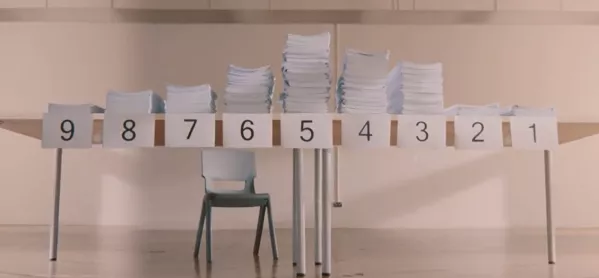Over the past few weeks, I have seen a number of schools talking about their plans for GCSE mocks.
For the most part, it seems schools will be running them at some point before Christmas - some have even said they will be running them in September as a benchmarking exercise.
Read more:
I think this would be a mistake. I won’t be asking my students to sit any mocks until January. And that is for three key reasons.
Coronavirus: Mock exams for next year’s GCSEs
1. We already know the answer. Pupils have forgotten loads
Remote learning has been difficult. Some students have adapted better than others, but everyone will have a weaker grasp of content after not being in front of a teacher.
With a long summer break, we already know student retention of knowledge will be weaker than it was when we last saw them in March.
Given this, what will a mock assessment tell us?
“John went from a grade 6 in his last assessment to a grade 3.”
Well, actually, he did not.
Firstly, his last assessment was in Year 10 when he was only being assessed on a sample of around 40 per cent of the GCSE content. Secondly, his mock in September only shows that a global pandemic and summer holidays have led to him forgetting some of what he has learned.
We did not need the test to tell us these points, so there is nothing to be gained from this “insight”.
It would be far better to get students back into the routines of being in a classroom and learning again, for us to spend some time teaching those foundational concepts that they need to master to unlock the rest of the curriculum.
2. A mock exam doesn’t tell us what students don’t know
Summative examinations make very poor formative assessments.
I could give my students a business GCSE past paper and question-level analysis might show that most of them got poor marks on a question justifying if an entrepreneur should start a business as a franchise or sole trader.
The problem is that I would not understand why students scored poorly on this.
They may not remember what a franchise is, or they may not know what the advantages of a franchise are. They may remember both these things but have forgotten what a sole trader is. They may remember all this but cannot explain any of the disadvantages. They might understand all of this but are not sure how to explain the impact of this on the entrepreneur or be unclear how to apply it to a case study.
If I do not know why students did poorly in this question, then I do not know what parts I should be reteaching.
A mock exam does not give me accurate information about what students don’t know and so there is no insight into what action I need to take. Far more useful would be a knowledge test of 100 short-answer questions where I can assess exactly what content students have forgotten.
3. We need to start to build students’ confidence up
Students will have read the alarmist headlines about a “lost generation” in the news. They need to start to build up their confidence to ensure they maintain motivation to get through what will be a stressful year.
Seminal research of self-efficacy from Albert Bandura shows that motivation comes from seeing success. How on earth will being told that they are “working at a 3” improve their motivation? High-quality teaching with tests that inform exactly what they know in a low-stakes environment is far more beneficial.
Where there are gaps in knowledge, I can reteach in small steps with lots of checking for understanding so students can get the opportunity to taste small successes to ensure they remain motivated.
Students have been through enough these past six months. We owe it to them to make every minute of their school experience from now on count.
Yousuf Hamid is a business and economics teacher at a high school in London





